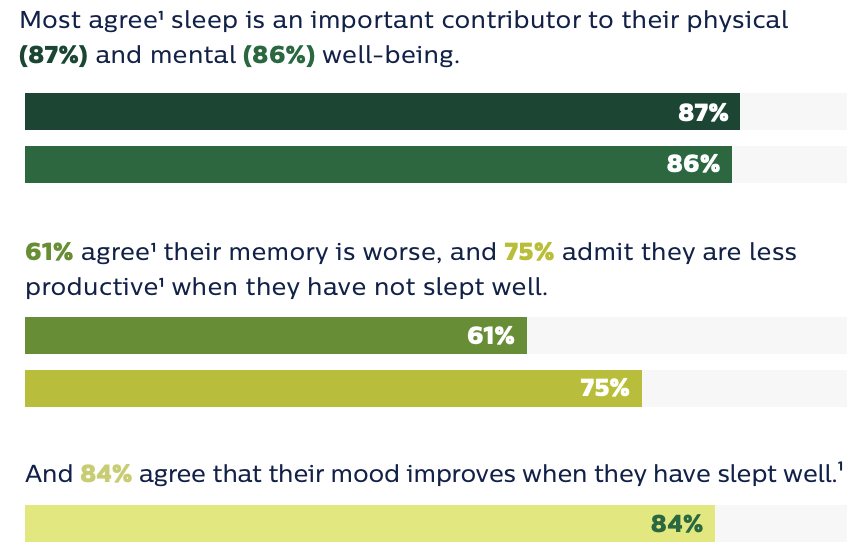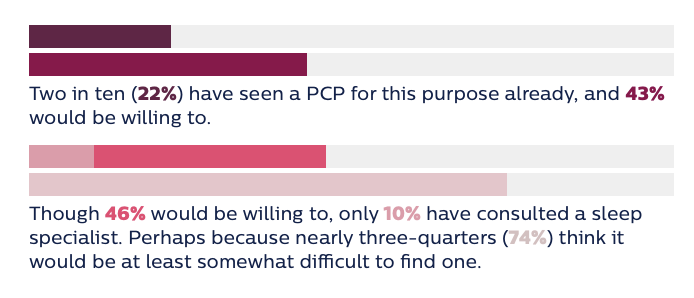With COVID-19, regular sleep schedules have been disrupted, which leads to interruptions in mental, cardiovascular, and endocrine health. While working from home, routines have been altered, less sleep is received, and sleep occurs at irregular times. Social distancing has resulted in less sunlight exposure, which directly affects our sleep/wake times and increases the amount of caffeine or alcohol consumption.
Now, picture this. Your alarm clock is ringing, the sun is rising, and all you want to do is hit snooze—if you’re tired of walking through life exhausted, you’re not alone!
We know that sleep is important—but do we always get it? Philips conducted an online survey of 13,004 adults ages 18 and over through the KJT Group, Inc. from November 12th, 2019 to December 5th, 2019. The participants were at a median age of 43 and from 13 different countries. The majority of those surveyed lived with a partner/spouse and were employed full time.
The Chief Medical Liaison, Dr. Teofilo Lee-Chiong, M.D., at Philips Sleep and Respiratory Care explained that “sleeping is not an evolutionary error or a momentary pause to a highly scheduled calendar; rather, it exists side-by-side with waking life, and neither endures without the other. ”
Let’s dive into how analyzing your sleep habits helps to increase your nightly rest.
Causes of Sleeplessness in Adults

The quantity and quality of your sleep translate to how you feel throughout the day, your mood, and your level of productivity. Even though sleep, diet, and exercise are the trifecta, those surveyed valued sleep at 38% over diet and exercise due to how much sleep subsequently affects mental and physical health. Close to 90% of the 13,004 people surveyed believed that sleep directly impacted their physical and mental health.
| Sleep deprivation leads to a higher potential for accidents as a result of drowsy driving, impaired decisions due to foggy brain, and memory loss, which affects our brain’s ability to store short and long-term memories. |
While focusing on your quality of sleep, you can also improve your diet by watching your sugar or caffeine intake. By limiting the amount of sugar you consume, you will be able to reach slow-wave sleep, which is essential for maintaining a healthy metabolism and strong immune system. Consuming too much caffeine leads to disruptions in your REM (rapid eye movement) cycle, which causes you to wake up in the morning feeling emotionally drained.
The root cause of sleepless nights for a third of those surveyed was worry and stress. As a majority of us have experienced, stress, worry, and anxiety can lead to tossing and turning, continuously counting sheep, or replaying the day over and over again for hours on end. On top of daily life stresses, the current pandemic causes more worry and stress about health, economic restraints, and the future, leading to increased instances of insomnia and difficulty sleeping. If worrying is keeping you up at night, we understand how frustrating a lack of sleep can be. That’s where weighted blankets come in. Weighted blankets help to calm your nervous system, fight insomnia, and lower stress all while increasing your comfort level.
Sleeplessness leads to the question of how much sleep are you then getting a night. Those surveyed reported getting around six hours of sleep on a weeknight and close to eight on the weekends. Does that reach the recommended hours of sleep the average adult needs each night?
We have found that adults from the ages of 26 to 64 years old need 7 to 9 hours of sleep each night. But can you repay your lack of sleep on the weekdays during the weekend? Yes and no. To settle up your sleep debt, you’ll need to devote your time and create a bedtime routine that focuses on getting your recommended hours of sleep in an effective manner, which means heading to the sleep doctor if you have any sleep disorders.
How Can We Improve Our Sleep?
Fifty-one percent of people that Philips surveyed are dissatisfied with the sleep they receive. But are you ready for the kicker? People around the world are taking less action to improve their sleep habits than they were in 2019.

While those surveyed are placing a high value on the need for sleep, results show that they aren’t doing much to ensure they get the sleep they want.
“When people place a high value in something, recognize they need to focus on it, but do not act, it is likely they feel a lack of confidence about how to improve things. We need to empower people, educate them on the available sleep resources, and let them see that their efforts will pay off.” Dr. Mark Aloia, Ph.D., Global Lead of Health Behavior Change at Philips Sleep and Respiratory Care
According to the survey, an average of 20% of people who used a sleep strategy in 2019 stopped using that strategy as of 2020. Of those activities geared towards improving sleep, soothing music, reading, sleep apnea therapy, and watching television topped the list for strategies people have used in the past but no longer use.
While not all sleep improvement strategies will work for everyone, it is important to test a few out to find what works best for you. We’ve found setting a bedtime routine or finding your ideal bedroom temperature are two easy approaches that have a high success rate on helping improve sleep quality!
| Looking for more insights on how to improve your sleep? Head over to our article that shares the best books on sleep to help improve your night! |
Around the World With Sleep Apnea

Now, are you wondering what about sleep apnea? Of those that Philips surveyed, 71% who utilize their CPAP therapy explain that the benefits exceed the cons and claim that their sleep has been upgraded since beginning their therapy.
However, 39% of those with sleep apnea think that the treatment is more difficult to undergo than the sleep issues that accompany it. While at the same time, 30% of those surveyed think that receiving sleep apnea treatment is not a necessity for treating sleep apnea.
The cherry on top is that half of those surveyed who have sleep apnea have not been prescribed CPAP therapy. What?!
But there is a bright side!
We understand that therapy may not be comfortable, but there are options and solutions available to give you your best sleep. Have you found the right mask for you? Your mask should meet your lifestyle needs such as if you often feel claustrophobia, have facial hair, are an active sleeper, or want to watch TV before bed. And guess what? We have masks to fit all of those lifestyle needs.
If you’re struggling to adjust to your treatment, it’s time to fall back in love with your CPAP therapy by diving into the root of your CPAP issues such as switching from a noisy machine, a mask that leaks, or adding humidification. The first 90 days of your CPAP therapy are crucial. To make your therapy a part of your lifestyle, try not to miss a night, clean your equipment regularly, and get comfortable wearing your mask by having it on while you’re awake.
We’re happy to see more people shift their health focus to the importance of sleep and hope to see that trend continue through the years. Getting a good night of rest is crucial to a successful and productive day! What are your thoughts on the survey results? Weigh in with a comment below.





3 Responses
I just received my new Phillips Dream Station. Day 1 was a success, cannot wait to see day 90.
Hi Erick, that’s wonderful! I hope your success with your DreamStation continues for many years.
If ever you have questions, or concerns, please give us a call at: 1-800-356-5221, or you may e-mail us at: cpap@cpap.com.
Best Wishes!
Interesting survey… Thanks for posting!
FYI, the name ‘Philips’ is misspelled in the title of the article “How Much Do You Value Sleep,” as well as on pages that link to it. The body of the article has the correct spelling (only one letter “ell”). It would be great if you could fix that, as Philips is the name of a major supplier, as I am sure you are aware.